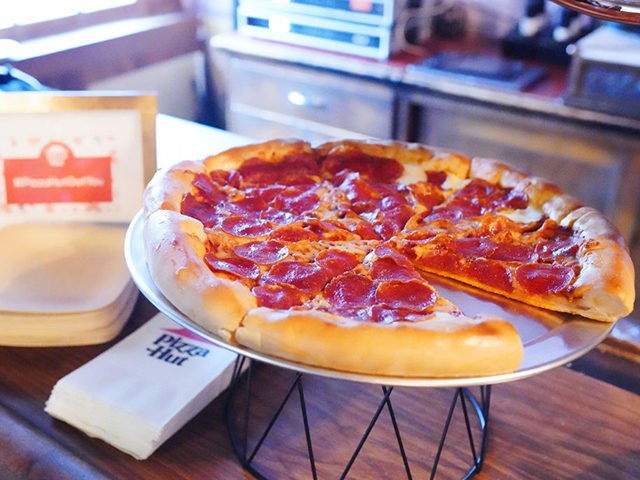Pizza Hut Japan has seen reservations for Christmas meals skyrocket in part due to the Chinese coronavirus pandemic, which has kept many from traditional dinners at restaurants, Japan’s Kyodo News noted Thursday.
Japan’s population is only believed to be about 1.5 percent Christian, so the celebration of Christmas as a religious institution is not popular there. Christmas has become a secular holiday for families to get together and share a meal — traditionally a special bucket package from KFC, which began marketing itself as a Christmas institution in the 1970s. Those who do not partake in the KFC tradition often go to high-end restaurants on December 25.
Japan — neighboring the nation where the pandemic originated, China — has implemented strict social distancing measures that will make large gatherings and restaurant meals impossible this year, significantly affecting dine-in restaurants.
Japanese officials have expressed heightened concern regarding the local outbreak of Chinese coronavirus this week as daily cases grow. Japan’s Health, Labor and Welfare Ministry revealed Thursday it had documented 3,450 new cases of coronavirus that day, the highest daily tally since the pandemic began.
Japan has cumulatively documented 210,743 cases of Chinese coronavirus and nearly 3,000 deaths; 640 people in the country are currently in severe condition, the Ministry said Thursday.
According to Kyodo, Japanese people seeking to celebrate Christmas have taken to both high-end restaurant take-out and to Pizza Hut, most staying home and observing social distancing measures.
“Pan-fried lobster and Japanese wagyu steak garnished with foie gras and truffles are being packed in plastic containers this year by Kihachi, a restaurant in Tokyo that specializes in French cuisine,” Kyodo noted. “The pandemic has also boosted demand for pizzas.”
According to the Japanese outlet, “Pizza Hut Japan Ltd., which oversees around 420 stores in Japan, said orders placed on the three weekdays leading up to Christmas Day have been much higher this year and that it has increased employees for that day in anticipation of heightened demand.”
Other increasingly popular items in Japan include board and party games, to play while cooped up at home, and cakes, to “ward off the coronavirus blues.”
Pizza Hut’s Japanese website is advertising a five percent off deal for those who reserve meals — presumably to pick up — for Christmas. On Twitter, Pizza Hut invited fans to play a bizarre game to find a cheese mascot hidden in an image of a Christmas meal.
Unlike America’s Pizza Hut, which typically offers only variations on classic toppings, its Japanese wing regularly debuts new flavors including Asian elements like curry and spicy chili sauces. Shrimp and other shellfish also make appearances on their pizzas.
Not all Japanese Christmas traditions are thriving this year, however. Japanese newspaper Asahi Shimbun noted this week that on Hokkaido, Japan’s northernmost island with a reputation for lush winter landscapes and tourism, owners of reindeer ranches expect to struggle with tourist revenue.
“About 50 reindeer at a ranch here would normally be as busy as their brethren at the North Pole getting holiday revelers ready for Christmas and Santa Claus,” Asahi noted, “But at Horonobe reindeer ranch in Horonobe town in Hokkaido, the reindeer are kicking back and relaxing this year, sidelined by the novel coronavirus pandemic.”
At Horonobe, the newspaper noted, “so far, only two reindeer have had an assignment.”
Pizza Hut’s Christmas deal is competing with the much more established Japanese KFC Christmas, the brainchild of Takeshi Okawara, the businessman who opened Japan’s first KFC. Okawara has publicly apologized for lying on national television and claiming that Americans eat fried chicken on Christmas, leading the Japanese to copy what many believed to be a legitimate Western tradition. In reality, Americans eat a wide variety of meals on Christmas Eve and Christmas day, typically reflective of their ethnic heritage. Roast turkey, holiday hams, seafood feasts (for Italian-Americans) and pork (for Latin Americans) are especially common, though many families have unique traditions.
KFC Japan confirmed this year that, in Japan, however, December 24 is their busiest day of the year, “ten times busier than KFC Japan’s annual average.”

COMMENTS
Please let us know if you're having issues with commenting.